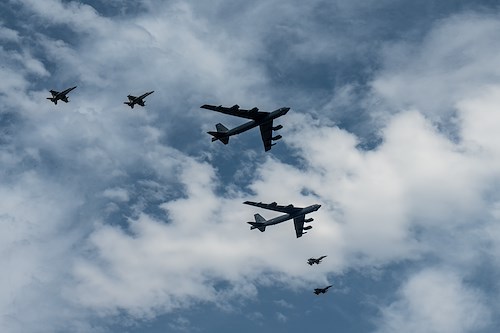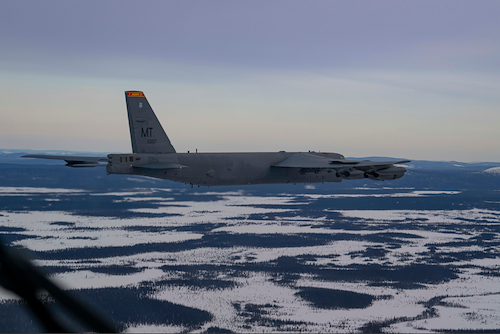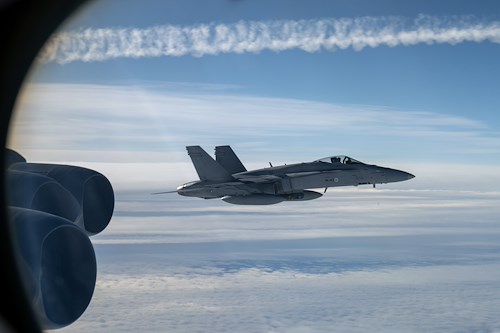Gallery contains 4 images
×
Photo 1 of 4
U.S. bombers arrive in Romania for Bomber Task Force 24-4
Two B-52H Stratofortresses from Barksdale Air Force Base, La., fly in formation with fighter jets from Romania and Finland as they arrive at Mihail Kogălniceanu Air Base, Romania, in support of Bomber Task Force Deployment 24-4, July 21, 2024. The U.S. military works alongside NATO Allies and partners to ensure a safe, stable, and secure Euro-Atlantic region by increasing military capabilities, readiness, and interoperability. (U.S. Air Force Photo by Senior Airman Seth Watson)
Photo by: Senior Airman Seth Watson
Photo 2 of 4
U.S. bombers arrive in Romania for Bomber Task Force 24-4
A KC-135 Stratotanker from the 100th Air Refueling Wing, Royal Air Force Mildenhall, England, refuels a B-52H Stratofortress from the 2nd Bomb Wing, Barksdale Air Force Base, La., while escorted by a Finnish F/A-18C Hornet during Bomber Task Force deployment 24-4, July 21, 2024. The U.S. military works alongside NATO allies and partners to ensure a safe, stable, and secure Euro-Atlantic region by increasing military capabilities, readiness, and interoperability. (Courtesy Photo)
Photo by: Senior Airman Seth Watson
Photo 3 of 4
U.S. bombers arrive in Romania for Bomber Task Force 24-4
A pair of B-52H Stratofortresses from Barksdale Air Force Base, La., fly in formation alongside Romanian and Finnish fighter jets as part of Bomber Task Force deployment 24-4, July 21, 2024. BTF 24-4 underpins the NATO alliance’s collective deterrence and commitment to defending the Euro-Atlantic region from hostile actions. (Courtesy Photo)
Photo by: Senior Airman Seth Watson
Photo 4 of 4
U.S. bombers arrive in Romania for Bomber Task Force 24-4
A B-52H Stratofortress from the 20th Bomb Squadron, Barksdale Air Force Base, La., makes its initial landing at Mihail Kogălniceanu Air Base, Romania, in support of Bomber Task Force Deployment 24-4, July 21, 2024. The lethal, long-range strike capabilities provided by strategic bombers influence the decision making of our nation’s competitors and adversaries by ensuring they know that the cost of military aggression would be outweighed by any potential gain. (U.S. Air Force Photo by Senior Airman Seth Watson)
Photo by: Senior Airman Seth Watson
Two U.S. Air Force B-52H Stratofortress aircraft assigned to the 2nd Bomb Wing, Barksdale Air Force Base, Louisiana, arrived at Mihail Kogalniceanu Airbase, Romania, for Bomber Task Force Europe 24-4, July 21, 2024.
While flying in international airspace and in accordance with international law, the U.S. B-52 aircraft were intercepted by two Russian aircraft over the Barents Sea at approximately 8 a.m. Central European Time. The U.S. aircraft did not change course due to the intercept and continued along their scheduled flight plan without incident, allowing the B-52s to perform their pre-planned mission which included integration alongside NATO fighter aircraft before landing at Mihail Kogalniceanu Air Base.
The B-52s flew in formation with fighter jets from Romania Finland as they arrived at Mihail Kogălniceanu Air Base, and while deployed, the they will operate as the 20th Expeditionary Bomb Squadron and will integrate with NATO Allies and other international partners to synchronize capabilities and assure security commitments across the U.S. European Command area of responsibility.
This marks the first time U.S. strategic bomber aircraft have operated out of Romania.
“In today’s global environment, it is vital that we be postured to deliver a range of sustainable capability from great distances. This iteration of Bomber Task Force offers an excellent opportunity to refine our agile combat employment tactics, techniques, and procedures,” said Gen. James Hecker, USAFE-AFAFRICA commander. “Through collaborative efforts with our Allies, the U.S. enables our forces to combat current and future threats.”
The U.S. routinely demonstrates its commitment to NATO Allies and partners through BTF missions. Through these missions, USAFE-AFAFRICA enables dynamic force employment in the European theater, providing strategic predictability and assurance for Allies and partners while contributing to deterrence by introducing greater operational unpredictability for potential adversaries.
“The U.S. is dedicated to work alongside our NATO Allies and partners along the Eastern Flank to ensure we have the combined skills and coordination capabilities necessary to maintain regional safety, security, and stability,” said Hecker.
Regular and routine deployments of U.S. strategic bombers demonstrate how the U.S. and NATO are ready, postured, and well prepared to integrate with host-nation Allies and partners to deter threats and defend the Alliance.
For more information, please contact the U.S. Air Forces in Europe – Air Forces Africa Public Affairs office atusafepao.pao@us.af.mil or, after hours, atusafepa.pastaffdutyofficer@us.af.mil.
















